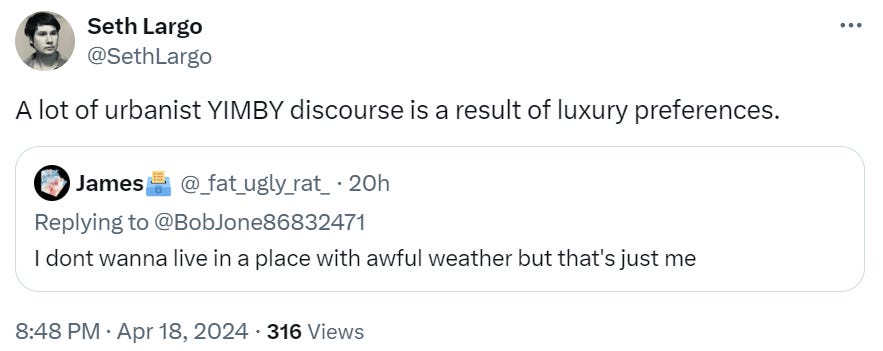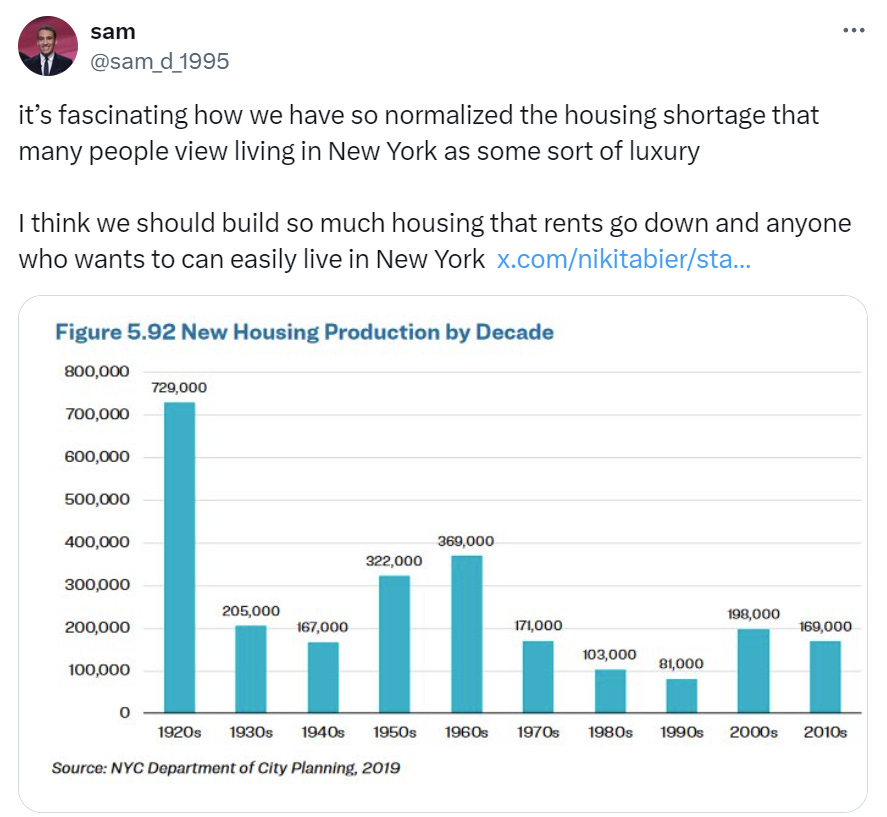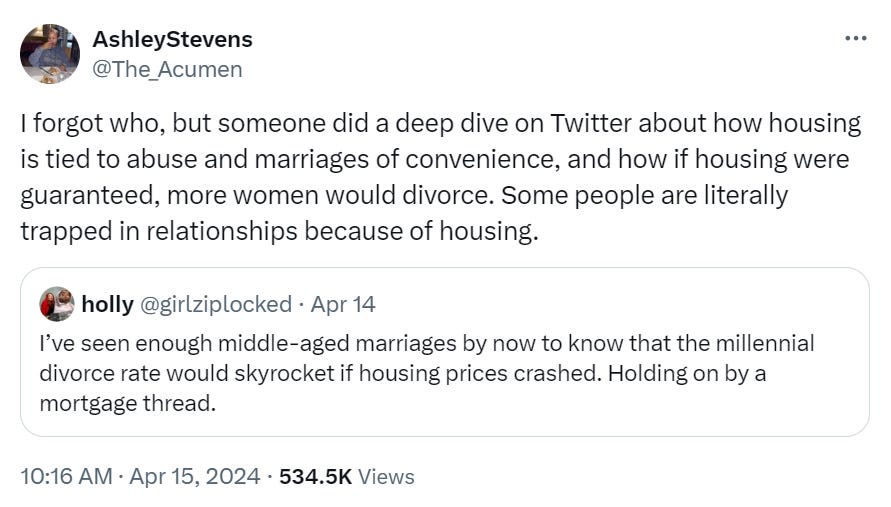Housing, YIMBYs, and "Luxury Preferences"
Housing, YIMBYs, and "Luxury Preferences"We need to build housing not just for people, but for cities and metro areas writ largeI saw this tweet the other day: I saw it because this fellow then asked me, “@ad_mastro What’s your rebuttal here? The history of humanity is a history of people moving for greener pastures instead of whining about why they can’t live where they want.” Well, thanks for asking! And you won’t be surprised that I have an answer. I’ll start by saying that I don’t particularly care for the individualist YIMBY framing that goes something like “I should be able to live anywhere I want.” This is not really consistent with reality or history. There have always been and always will be more affordable and more expensive cities, and neighborhoods within those cities. There will always be people who are too affluent to need or qualify for subsidized or affordable housing, but not affluent enough to afford their dream home in their dream neighborhood. Building a lot more housing in lots of places may control or even bring down rents—10 or 20 percent, maybe, eventually. Something significant for people and families who are not very rich. It might return housing to an asset that generally appreciates a decent amount over time, so you can sell and trade up with your accumulated equity. It might return markets like my own in Northern Virginia to something expensive but sane—a house, for example, that just sold for a whopping $950,000 might go back to costing $600,000 or $700,000. (Even that’s an extremely high price, when you look at all the country’s regional housing markets.) Building housing isn’t suddenly going to crater housing prices. Building smaller units might, which is a trade-off that some folks may want and others may need to make. These tiny apartments in Tokyo—less than 100 square feet—rent for somewhere in the $400-$700 range, monthly. That strikes me as something that might work for a lot of young people, for a year or two, or maybe a few. I’m not sure the folks who think YIMBY means unlocking every neighborhood at every age and income level are imagining 95 square feet of space for themselves. All of this is to say that there probably are some 20-somethings on social media who think a spike in homebuilding is suddenly going to mean they can live anywhere at a price they can afford. And for a number of reasons, that probably won’t happen. I can imagine, if the only YIMBY stuff I saw was this sort of “build housing so I can live cheap in Manhattan!” stuff, that I might think YIMBYs were spoiled brats. The answer—that everyone should be able to live in Manhattan because Manhattan is awesome—doesn’t quite feel emotionally satisfying. There’s some part of me—the conservative in me, I guess—who just wants to say you can’t always get what you want. Maybe I’m just traumatized from my mom singing that Stones lyric at me when I wanted something she didn’t want to get me. But I’d like to think it’s a little more than that. This is why some folks interpret YIMBY as being about handouts—they seem to have trouble distinguishing “build more housing and raise the supply so prices come down” with “give me a house!” They’re wrong, but there are some housing advocates who in my opinion blur that line. On the other hand, “you can’t always get what you want” or “life’s not fair” are observations about the vagaries of life and the trade-offs we inevitably have to make—like maybe living in a tiny apartment if you want a prime location. They’re not public policy prescriptions. I sometimes get the sense that conservatives think the role of public policy is to reinforce the unfairness of life, rather than to reduce it where possible. I also get the sense that we start to see the effects of our policy failures as inherent slings and arrows of life, and begin to feel that there is some sort of “cheating” involved in remedying them. I see this in myself with silly things like using a colander and a bowl instead of a salad spinner to wash veggies. I reserve the salad spinner with its easy mechanical advantage for special days. I get used to dealing with some semi-broken implement and start to feel like it would be vaguely wrong to replace it. If you deal with adversity long enough, you make your peace with it. But breaking out the salad spinner is morally neutral. It’s using the right tool for the job. Building housing and driving down our artificially high prices is likewise using the right tool—the market—for the job of aligning our housing market with our broader economy. There is no more “cheating” involved in recognizing the economics of land prices and building smaller, denser housing in core locations than there is in using a chainsaw to cut down a tree. Density is not political. It isn’t a culture war or an ideology. It’s simply the natural response to expensive, in-demand, scarce land. When you’re running out of room in your office, and you buy a desk hutch, or a taller bookcase, you are doing the same thing for the same reasons. I sometimes say housing is a practical issue, not a culture-war issue. What I mean is, all of the suspicion and ideology and politicking is an overlay on top of the basic economics at play. So. Let me now pivot a bit. If you—like me—think there’s something a little galling about “I should be able to live anywhere I want!”, what do you think the proper opposite of that is? In other words, what would it mean for somebody not to be able to live anywhere they want? Here’s an example of what might look to some folks as “entitlement” on this question: What would it mean, however, to say that living in New York is a luxury? To determine that the sky-high housing prices in that city, and in many other desirable, job-rich metros, are simply fixed and unalterable realities, and that the only realistic options are to work harder, or to move somewhere cheap (with fewer jobs)? I suspect most of the folks who stop at “What a spoiled brat!” aren’t thinking about this inverse. They’re mostly folks for whom the housing crisis is not an urgent matter. It’s easy for them to imagine the issue isn’t “real”: just another complaint from the youngs. But the opposite of “I should be able to live anywhere” is it is good and appropriate for entire cities or even entire metro areas and regions to be closed off to entire ages, income levels, and groups of people. This is not how cities work. This is not how economies work. Some will counter that the young people must make trade-offs. But the real housing advocacy point here is that zoning doesn’t even allow us to make those trade-offs. There are no 95-square-foot apartments to test the thesis that what we really want is a lot of cheap space in the middle of everything. This is why I’m so fascinated by language and framing, and in doing what I once called here “urbanist ecumenism.” Is “I should be able to live anywhere I want at a price I can afford” actually different in substance from “Cities must be able accommodate people at all ages, stages of life, and income levels”? I don’t really think so, yet I feel like the average person would be put off by the entitlement of the first statement while at least theoretically sympathetic to the second one. In other words, in addition to pointing out how urbanism, broadly understood, can function as a bundle of lifestyle amenities, we must also convey how they benefit our places writ large. It reminds me of this: I can hear some of my conservative acquaintances saying Ah, so you people want to build housing to help break up families! or some such. That’s a bad-faith reading of the point, but be that as it may, the thing is housing also makes it easier to get married and start a family. It makes both of these things easier, because it simply makes life easier. Our argument isn’t that housing is a subset of family policy per se, but that housing should not be an arbitrary and artificial choke point in people’s personal lives. This is one of those artificial, imposed adversities with which we’ve unfortunately made our peace. Some people’s politics is simply the knee-jerk opposite of the views of people they don’t like. That way of doing politics is how “maybe we should build more housing in extremely expensive markets” has transformed from obvious and reasonable to suspicious and entitled. So that’s what the actual opposite of “I should be able to live anywhere I want” is—that some cities are only for some kinds of people. That students, young singles, young families, retirees, and the folks who cook and clean and teach and police and make cities run simply have no place. No city or metro area can run like that. No city is ever rich enough and expensive enough to stop needing its working class or its starving artists or the assemblages and cross-sections of people that make a city what it is. You can resist or oppose new housing because you don’t like the tone of some of its proponents. But you’d be cutting off your nose to spite your face. And some of us don’t have that luxury. Related Reading: Apartments, Ownership, and Responsibility Still Renting After All These Years Thank you for reading! Please consider upgrading to a paid subscription to help support this newsletter. You’ll get a weekly subscribers-only piece, plus full access to the archive: over 900 pieces and growing. And you’ll help ensure more like this! You're currently a free subscriber to The Deleted Scenes. For the full experience, upgrade your subscription. |
Older messages
Storage Is Retrieval
Saturday, April 27, 2024
A little piece of work and life wisdom ͏ ͏ ͏ ͏ ͏ ͏ ͏ ͏ ͏ ͏ ͏ ͏ ͏ ͏ ͏ ͏ ͏ ͏ ͏ ͏ ͏ ͏ ͏ ͏ ͏ ͏ ͏ ͏ ͏ ͏ ͏ ͏ ͏ ͏ ͏ ͏ ͏ ͏ ͏ ͏ ͏ ͏ ͏ ͏ ͏ ͏ ͏ ͏ ͏ ͏ ͏ ͏ ͏ ͏ ͏ ͏ ͏ ͏ ͏ ͏ ͏ ͏ ͏ ͏ ͏ ͏ ͏ ͏ ͏ ͏ ͏ ͏ ͏ ͏ ͏ ͏ ͏ ͏ ͏ ͏ ͏
New and Old #159
Friday, April 26, 2024
Friday roundup and commentary ͏ ͏ ͏ ͏ ͏ ͏ ͏ ͏ ͏ ͏ ͏ ͏ ͏ ͏ ͏ ͏ ͏ ͏ ͏ ͏ ͏ ͏ ͏ ͏ ͏ ͏ ͏ ͏ ͏ ͏ ͏ ͏ ͏ ͏ ͏ ͏ ͏ ͏ ͏ ͏ ͏ ͏ ͏ ͏ ͏ ͏ ͏ ͏ ͏ ͏ ͏ ͏ ͏ ͏ ͏ ͏ ͏ ͏ ͏ ͏ ͏ ͏ ͏ ͏ ͏ ͏ ͏ ͏ ͏ ͏ ͏ ͏ ͏ ͏ ͏ ͏ ͏ ͏ ͏ ͏ ͏ ͏ ͏ ͏ ͏ ͏
Preserving Process
Thursday, April 25, 2024
Sometimes someone else says it best ͏ ͏ ͏ ͏ ͏ ͏ ͏ ͏ ͏ ͏ ͏ ͏ ͏ ͏ ͏ ͏ ͏ ͏ ͏ ͏ ͏ ͏ ͏ ͏ ͏ ͏ ͏ ͏ ͏ ͏ ͏ ͏ ͏ ͏ ͏ ͏ ͏ ͏ ͏ ͏ ͏ ͏ ͏ ͏ ͏ ͏ ͏ ͏ ͏ ͏ ͏ ͏ ͏ ͏ ͏ ͏ ͏ ͏ ͏ ͏ ͏ ͏ ͏ ͏ ͏ ͏ ͏ ͏ ͏ ͏ ͏ ͏ ͏ ͏ ͏ ͏ ͏ ͏ ͏ ͏ ͏ ͏ ͏
Butchered Literature
Wednesday, April 24, 2024
What Do You Think You're Looking At? #159 ͏ ͏ ͏ ͏ ͏ ͏ ͏ ͏ ͏ ͏ ͏ ͏ ͏ ͏ ͏ ͏ ͏ ͏ ͏ ͏ ͏ ͏ ͏ ͏ ͏ ͏ ͏ ͏ ͏ ͏ ͏ ͏ ͏ ͏ ͏ ͏ ͏ ͏ ͏ ͏ ͏ ͏ ͏ ͏ ͏ ͏ ͏ ͏ ͏ ͏ ͏ ͏ ͏ ͏ ͏ ͏ ͏ ͏ ͏ ͏ ͏ ͏ ͏ ͏ ͏ ͏ ͏ ͏ ͏ ͏ ͏ ͏ ͏ ͏ ͏ ͏ ͏ ͏
Serendipity And Proximity
Tuesday, April 23, 2024
Thoughts on the psychological costs of distance ͏ ͏ ͏ ͏ ͏ ͏ ͏ ͏ ͏ ͏ ͏ ͏ ͏ ͏ ͏ ͏ ͏ ͏ ͏ ͏ ͏ ͏ ͏ ͏ ͏ ͏ ͏ ͏ ͏ ͏ ͏ ͏ ͏ ͏ ͏ ͏ ͏ ͏ ͏ ͏ ͏ ͏ ͏ ͏ ͏ ͏ ͏ ͏ ͏ ͏ ͏ ͏ ͏ ͏ ͏ ͏ ͏ ͏ ͏ ͏ ͏ ͏ ͏ ͏ ͏ ͏ ͏ ͏ ͏ ͏ ͏ ͏ ͏ ͏ ͏ ͏ ͏
You Might Also Like
5-Bullet Friday — How to Choose Peace of Mind Over Productivity, Guinean Beats for Winding Down, Lessons from Legendary Coach Raveling, and a New Chapter from THE NO BOOK
Saturday, March 1, 2025
"Easy, relaxed, breathing always leads to surprise: at how centred we already are, how unhurried we are underneath it all." — David Whyte ͏ ͏ ͏ ͏ ͏ ͏ ͏ ͏ ͏ ͏ ͏ ͏ ͏ ͏ ͏ ͏ ͏ ͏ ͏ ͏ ͏ ͏ ͏ ͏ ͏ ͏ ͏
Nicole Kidman's “Butter Biscuit” Hair Transformation Is A Perfect Color Refresh
Saturday, March 1, 2025
Just in time for spring. The Zoe Report Daily The Zoe Report 2.28.2025 Nicole Kidman's “Butter Biscuit” Hair Transformation Is A Perfect Color Refresh (Celebrity) Nicole Kidman's “Butter
David Beckham's Lifestyle Keeps Him Shredded at 50
Friday, February 28, 2025
View in Browser Men's Health SHOP MVP EXCLUSIVES SUBSCRIBE David Beckham's Lifestyle Keeps Him Shredded at 50 David Beckham's Lifestyle Keeps Him Shredded at 50 The soccer legend opens up
7 Home Upgrades That Require Zero Tools
Friday, February 28, 2025
Skype Is Dead. There are plenty of ways to make quick improvements to your house without a single hammer or screwdriver. Not displaying correctly? View this newsletter online. TODAY'S FEATURED
Heidi Klum Matched Her Red Thong To Her Shoes Like A Total Pro
Friday, February 28, 2025
Plus, the benefits of "brain flossing," your daily horoscope, and more. Feb. 28, 2025 Bustle Daily Here's every zodiac sign's horoscope for March 2025. ASTROLOGY Here's Your March
How Trans Teens Are Dealing With Trump 2.0, in Their Words
Friday, February 28, 2025
Today in style, self, culture, and power. The Cut February 28, 2025 POWER How Trans Teens Are Dealing With Trump 2.0, in Their Words “Being called your correct name and pronouns can be the difference
The Eater Oscars for best bites in film this year
Friday, February 28, 2025
An NYC cafe garners celebrity support after rent hike
The Must-See Movies The Oscars Overlooked
Friday, February 28, 2025
Plus: Celebrities pay tribute to Michelle Trachtenberg. • Feb. 28, 2025 Up Next Your complete guide to industry-shaping entertainment news, exclusive interviews with A-list celebs, and what you should
The Best Cropped Jackets for Spring, Styled by Us
Friday, February 28, 2025
Plus: What we carried in our bags at Fashion Week. The Cut Shop February 28, 2025 Every product is independently selected by our editors. Things you buy through our links may earn us a commission.
The chicken and the eggs
Friday, February 28, 2025
and where they both come from ͏ ͏ ͏ ͏ ͏ ͏ ͏ ͏ ͏ ͏ ͏ ͏ ͏ ͏ ͏ ͏ ͏ ͏ ͏ ͏ ͏ ͏ ͏ ͏ ͏ ͏ ͏ ͏ ͏ ͏ ͏ ͏ ͏ ͏ ͏ ͏ ͏ ͏ ͏ ͏ ͏ ͏ ͏ ͏ ͏ ͏ ͏ ͏ ͏ ͏ ͏ ͏ ͏ ͏ ͏ ͏ ͏ ͏ ͏ ͏ ͏ ͏ ͏ ͏ ͏ ͏ ͏ ͏ ͏ ͏ ͏ ͏ ͏ ͏ ͏ ͏ ͏ ͏ ͏ ͏ ͏ ͏ ͏ ͏ ͏ ͏


